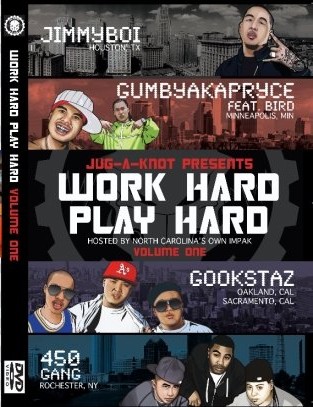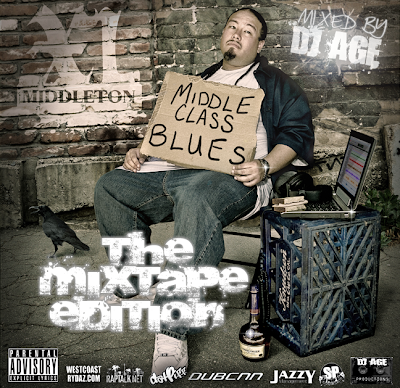
Kensho Kuma is a rapper from Berkely, California. He was born in Yokohama, Japan and his family later moved to the United States in 1985. He has been rapping for over 12 years and raps in both English and Japanese. Kensho Kuma has also lived in mainland China and in Japan and has played an active role in both the Chinese and Japanese hip hop scene. His debut album is called
Rewritten Code ov Honor and was released in 2006. I had the pleasure of corresponding with Kensho Kuma and thought would be really cool to interview him to tell us what he is all about and also tell us about his experiences in mainland China and Japan.
ROYAL: First of all Kensho Kuma, thank you for doing this interview for the readers of Asian Rap Worldwide.
KUMA: What up Royal, thank you for featuring me on your site, I appreciate it!
ROYAL: So tell us the story on how you got the name "Kensho Kuma" and a bit on how you got in to rapping.
KUMA: ‘Kuma’ means ‘Bear’ in Japanese, as you probably know, the symbol of California is the grizzly bear, that name was meant for me! ‘Kensho’ has a deep Zen enlightenment definition, but I’m not going to front like that’s the origin of my name; like many children who immigrated to the United States at a young age, I adopted an American name in school so the other students could pronounce it. My Japanese name is Koichiro, my American name was ‘Ken,’ eventually that became ‘Kensho.’ I remember liking and being interested in Hip Hop when I was in Junior High, but it was the early Wu releases that really got me interested in MCing; their usage of language, kung- fu samples, and multiple aliases… something about them at the time really got to me. I’ve been rhyming non- stop since ’97- ish.
ROYAL: You're from the Bay Area. Are you influenced at all by the hyphy movement? Is it something you represent? What's your take on it?
KUMA: Although I don’t personally represent the Hyphy movement, I naturally support it and have always had a positive outlook on it; my personal interpretation of the movement is that, its young people rebelling, they don’t give a f**k about what the mainstream society thinks or feels about them. I believe that Hyphy and any local music movement will ultimately affect the artists in its immediate proximity; in other words, if you’re a Bay Area artists, you have to be aware of what’s going on in your area, especially if it’s popular as the Hyphy movement, if not then you’re oblivious and not connected to your own backyard.
 ROYAL:
ROYAL: Out of curiosity, what got you to pack your bags and start living all over China and Japan? And how did you get involved in both the Chinese and Japanese hip hop community?
KUMA: After I graduated from college in ’03, I was going through some personal situations and was skeptical about my life in general, I wasn’t feeling it; I took the ‘leap of faith’ and gave up everything in my life and moved to Asia, I felt it in my gut. At the time, I had spent my entire adult life in the Bay and that’s all I knew; I love the Bay , but I knew there was so much more out there; it was a move I had to make at the time. Although I was born in Japan, I had never lived there for a prolonged period of time as an adult, also my best friend was out in Chengdu, China, living and performing; I had to leave my life in the Bay and go explore Asia, all the opportunities were there for me and it was about taking that ‘leap of faith’ to experience more things in Asia.
ROYAL: Tell us about your travel experience in China. What was it like traveling all over China? Did you experience any culture shock? Did it at all affect on how you see life? How did you get by without speaking a word of Chinese?
KUMA: There are no words to accurately describe my experiences in China; I lived in Chendu, which is in the Sichuan province in western China, and in Shanghai, on the opposite end of the country. I traveled throughout the country and performed in many places; the most memorable place must’ve been Urumuqi, which is near the border of Kazakhstan, the Uyghur Muslim minorities live there. Our westernized way of perceiving the world isn’t the only perspective which is out there, what we take for granted, what is ‘normal’ to us, is completely alien to lots of countries outside of the United States. A lot of my crew in China are of non- Asian ethnicities, who’ve lived in China for years and had acquired fluency in the language, I couldn’t speak a word of Chinese. The concept of an ‘Asian- American’ person seize to exist in many places in Asia, I must’ve been the strangest anomaly to rural China: an Asian person in China asking his European friend to translate for him. My years living in China definitely affected the way I look at this world, and to tell you the truth, I’m still processing the information.
ROYAL: Have you came across any "Conscious hip hop" while in China? You know like "Fight the Power" or Public Enemy-ish kind of rap music where they rap about social issues or criticize the media etc? Is that even allowed in China?
KUMA: Although I know of some dope Chinese MC’s who spit insightful lyrics, I didn’t come across P.E.- esque ‘Conscious Hip Hop’ in China; I’m not sure if the government would allow any form of public anti- government expression, especially not with something that will draw immediate attention like Hip Hop. There are certain things you can and can’t do in each country; there are certain things an intelligent person should and shouldn’t do in each county…
ROYAL: How do you compare the reception of your music in the United States compared to Asia? Do you find that being an Asian-American rapper has its disadvantages in the United States? In the same token, do you feel that being an Asian-American has its advantages in Asia?
KUMA: My Asian- American background had an enormous advantage in Asia. The Japanese Hip Hop community has always shown tremendous support and appreciation because I have always repped my Japanese heritage; however I feel that it isn’t necessarily just the ancestry, but the fact that I flow in English and am aware of Japanese culture and society. The Hip Hop scene in Shanghai is heavily influenced by expat promoters and crowds; meaning a high percentage of the Hip Hop scene is proficient in English… But I feel the most important factor is that, I’m an authentic talent from the Bay Area who has always cherished my native language and background. I can only allow my ethnicity and background to be used as an advantage back home in the states; let’s be honest, we have always had lots of artists who claim to be samurais, ninjas, ronins, monks, and shoguns, who are of non- Japanese descent. I don’t mean this in a derogatory way. Japanese/ Asian culture has always been perceived as something really attractive and cool in American Hip Hop, and that’s a really beautiful thing, because Hip Hop culture has become a globally inclusive culture.
 ROYAL:
ROYAL: Tell us about the crowds. Are Asian crowds generally quieter, and more restrained, and less wild compared to crowds back in the United States?
KUMA: Difficult question, people in homogeneous countries in Asia, like mainland China and Japan, identify as ‘Chinese’ or ‘Japanese,’ not necessarily ‘Asian.’ If you’re a non- Japanese ‘Asian’ person in Tokyo, you’re still a ‘gaijin.’ The idea of an ‘Asian- American’ person doesn’t seem to exist yet in the masses in lots of places in Asia, especially in the rural areas. So we’re really comparing many different factors which may not be able to be compared. Are crowds in Japan and China more quiet, more restrained compared to Asian- American crowds in the states? That’s completely contingent on the venue, performers, amount of alcohol and crowd; I don’t know how and what to generalize to answer this one.
ROYAL: What are your own personal thoughts on Chinese and Japanese hip hop? How does it compare to hip hop in the United States? Are Chinese and Japanese rappers for the most part awkwardly imitating rappers from the States? Are there any crucial elements that you feel that are missing in Chinese and Japanese hip hop? What's your take on it?
KUMA: The Japanese have their own Hip Hop history, which started back in the early/ mid 80’s. Naturally, all foreign Hip Hop scenes have always been influenced by American Hip Hop because this is where the culture originated; however, I am proud to say that the Japanese have always been able to incorporate a noticeable amount of their own identity and ideology into the music, and the diverse array of new generation independent Japanese MC’s are dope on any Hip Hop rector scale. You don’t have to even understand the language, you know they’re spitting. The Chinese Hip Hop history is a little bit shorter, my friend Dana Burton is commonly credited with bringing Hip Hop to China about a decade ago; the current Chinese Hip Hop scene is heavily battle orientated, and Burton’s annual ‘Iron Mic’ contest, where Chinese MC’s from around the country compete, has been going strong for about 5, 6 years I think. Yes, there are lots of rappers in Asia, who awkwardly imitate American rap; the images on MTV/ BET are the most accessible sources for Hip Hop anywhere. However there are plenty of MC’s in Asia who are the accurate equivalents of their U.S. counterparts, who have developed their own understanding of Hip Hop and rhyme in their own language. I humbly acknowledge that this is strictly written from the MC viewpoint and that it didn’t mention graffiti artists, b- boys, or DJ’s; the other elements get more appreciation in Asia.
ROYAL: Who are the Chinese and Japanese rappers that really stick out to you?
KUMA: Japanese MC’s I really like and am influenced by include: Maccho of Ozrosaurus, Zeebra, MC Kan from MSC, Shingo Nishinari and Kemui. Chinese MC’s I feel are Young Kin from Beijing and my friend Tang King from Shanghai.
ROYAL: Let's talk about your debut album. Can you describe for us what is the Rewritten Code Ov Honor? What's the scoop behind the title of the album? You also had a track with Shing02. What was that like working with him?
 KUMA:
KUMA: My debut album ‘Rewritten Code ov Honor’ was released in late ’06, it took about 4 years to complete the project; I don’t necessarily rep ‘Asian American Rap,’ as a matter of fact, I’ve never said that phrase, it’s simply the best Hip Hop I could deliver at that point in my life. Samurais, and all other warrior cultures, have their own ‘code of honor,’ these are certain values and morals you must respect and follow at all costs. I know this sounds romanticized, but I consider those values to be more important than most other things a person can experience; I’m a Japanese American Berkeley MC who’s a descendent of samurais, I had to call my first album ‘Rewritten Code ov Honor.’ Shing02 is also a Japanese artist who resides in the Bay Area, he was kind enough to do a track with me; he’s probably one of the deepest minds we have in Hip Hop today.
ROYAL: Now your debut album ReWritten Code Ov Honor was nationally distributed in Japan. How did you get your album nationally distributed?
KUMA: An owner of a label in Tokyo believed in my music enough to handle the distribution for me; he was able to get me in all the Tower Records and HMV’s in Japan.
ROYAL: You have a new single that's out called Swordz Up. Tell us about this single.
KUMA: Argentinean super producer Say sent me a beat tape, I heard the beat, I knew immediately that it was perfect for me; the song features a drop from Talib Kweli, who I had the privilege of opening for in Shanghai at an outdoor festival. The song features my rhymes in English and in Japanese, Say is also spitting in Spanish. I’ve had an overwhelmingly eventful journey in music, the least I could do is to acknowledge and pay homage to the Hip Hop artists around the globe with ‘Swordz Up!’
ROYAL: So what does the future hold for Kensho Kuma? Are you working on any new projects? Do you plan to release another album?
KUMA: I’m working on ‘the Life Force Project,’ it’s a multilingual Hip Hop album; I’ve been taking mad time with the mixes on each track, and even more time with writing, I’m uncertain how many tracks will be on the final product. It should be ready by summer ’09 and I plan to go on another Asia venture once it’s done. I also work as a teacher, I’m currently working on my Master’s degree to further my day time career, I’m finally at the point in my life where I should take more than just Hip Hop seriously, I think.
ROYAL: Any words of wisdom for up-and-coming rappers? Any advice for rappers that want to perform and promote their music in Asia?
KUMA: It took me years to learn that there is more to life than just music. You can’t be a dope MC if you aren’t a dope person. If you want to perform in Asia, I recommend that you research an extensive amount about where you want to go, including the language and what’s currently going on in their local scenes. It’s a cliché to say ‘real recognize real,’ but there are talented unknown artists holding it down anywhere you go, and I know from experience that they have something in common with you.
ROYAL: What is the best way for people get a hold of you?
KUMA:Contact:
www.myspace.com/kenshokuma (website coming very soon!)
CD Baby:
http://cdbaby.com/cd/kenshokumaWe Nod Records Japan:
http://www.wenod.com/shop/cd/kensho_rewritten.htmlROYAL: Kensho Kuma, its been a pleasure. Thanks for taking the time for this interview.




























 Asian Hip Hop Connect Vol. 2
Asian Hip Hop Connect Vol. 2 Asian Hip Hop Connect Vol. 1
Asian Hip Hop Connect Vol. 1


